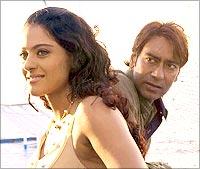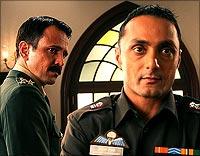It really hurts that the very act of writing the Friday reviews has been reduced to a sort of pattern these days. We talk about the stars, the director, sum up the effort in a few brief lines, and then, almost inevitably, go on to discuss exactly which DVDs the spanking new film has been filched from. It's disgraceful, and, frankly, rather tiresome.
Have we legitimised the very act of copying? If everything's a copy, does that automatically make it cool to have done so?
And what then, of the good stuff? A charmingly remade film, for example, Mahesh Bhatt's tenderly made yet nearly scene-by-scene lift of It Happened One Night, Dil Hai Ki Manta Nahin? And what of hilarious remakes of regional cinema, like Priyadarshan's uproarious Hera Pheri or even Hrishikesh Mukherjee's magnificent adaptations of the Bengali comedies?
The other day, a director friend brought up the idea of remaking a recent-ish Hollywood romance, a powerful drama with two women protagonists of varying ages. Before shaking head in disdain, I was explained in detail about how the two characters would be recontextualised into an Indian milieu, and how their very problems could, too, be shaken out and made local, very addressable issues. Suddenly the project positively smelt of worthiness, yet, while very different in content from the original film, was essentially a lift. What to make, then, of such a film?
There is, of course, a pretty thick line between plagiarism and inspiration. It is perfectly reasonable to borrow from a film one has liked, to pick up, say, narrative style or linearity or structure or even take established plotpoints but weave a different story around them. Of course, the act of addition is all-important.
 The fact that Ajay Devgan took the crucial narrative skeleton from The Notebook cannot be disputed: it, too, has an old man reading to his aged lover, and the story of memory is recollected in flashback. Yet what the story itself is, is all authentic. Ajay and Piya's post-marital issues in U Me Aur Hum are nothing like the original film's love-between-classes melodrama (which itself was rather Bollywood-ised, to say the least, funnily enough) and it is that sincerity which makes the film work.
The fact that Ajay Devgan took the crucial narrative skeleton from The Notebook cannot be disputed: it, too, has an old man reading to his aged lover, and the story of memory is recollected in flashback. Yet what the story itself is, is all authentic. Ajay and Piya's post-marital issues in U Me Aur Hum are nothing like the original film's love-between-classes melodrama (which itself was rather Bollywood-ised, to say the least, funnily enough) and it is that sincerity which makes the film work.
A recent film called Strangers tried to give an interesting twist to Alfred Hitchcock's Strangers On A Train, and while it was a rather sloppily made film, it does get points for trying out something quirky instead of flicking the entire plot.
Still, originality itself means different things to different people. Clearly Sanjay Gupta and I, for example, do not quite see eye-to-eye on the subject.
The question now is one of credit.
The debutant director behind Strangers, a man called Aanand Rai, ridiculously distanced himself from Hitch's classic, saying there was nothing in common between the films. And he's not the first -- or likely to be the last, as evidenced by a recent Rahul Bose interview vaguely in defense of Shaurya where the actor said he hadn't seen A Few Good Men before going on to say that the Minissha Lamba character isn't quite like the Demi Moore character. Um, okay.
The problem is that in today's times of international movie channels, exhaustive DVD libraries and Bittorrent downloads, everyone is likely to have seen the original, and it's purely stupid to try and convince us otherwise.
It is also more possible than ever to go legit, just like the Priyan and Hrishida comedies, always made with acknowledgement and permission.
 Mallika Sherawat's first home production, Fauj Mein Mauj, is about a ditsy hottie drafted into the army, and so I asked why she'd embark on something where critics would go to town with their axes, drawing comparisons with Goldie Hawn's Private Benjamin. The stunner is, however, unfazed. She's bought the rights to the original film, and this is an officially licensed remake. A seriously smart move, that. Now we can review without having to talk about which scene is lifted from which DVD, and judge the adaptation on its own merit.
Mallika Sherawat's first home production, Fauj Mein Mauj, is about a ditsy hottie drafted into the army, and so I asked why she'd embark on something where critics would go to town with their axes, drawing comparisons with Goldie Hawn's Private Benjamin. The stunner is, however, unfazed. She's bought the rights to the original film, and this is an officially licensed remake. A seriously smart move, that. Now we can review without having to talk about which scene is lifted from which DVD, and judge the adaptation on its own merit.
Ravi Chopra, making a comedy called Banda Yeh Bindaas Hai about a couple of youngsters going to prison who need a flamboyant lawyer relative and his sassy girlfriend to bail them out, has bought the rights to My Cousin Vinny even though his film isn't a complete copy. He says the rights cost him a tiny percentage of the film's overall cost, and after consultation with several filmmakers and producers, I've realised it's true: your film could be made legit for the price of an item song.
It's a startling thought, the idea that we can both borrow an idea ('in these creatively bankrupt times,' as the industry keeps loudly lamenting) and, officially, share the credit. It wouldn't cost much and the process isn't as long-drawn as it was a couple of decades ago, which is the probable defense of the long-aforementioned reworking of old-world Hollywood classics.
All would be well, except...
Well, our filmmakers would have to be satisfied with hogging a little less of the credit, with having to say it's not their vision, without the 'written by' tag.
And that, in the ego-bubble called Bollywood, isn't likely to happen anytime soon. Sigh.
Please write in with your comments on this and whatever you feel like at senterfold@rediffmail.com and I'll see you all next week. Ciao.
P.S. -- Thanks for the overwhelming email response to the column about television shows. Have already started on your recommendations and the funny thing was that a day after I praised it to the skies, Dexter won the prestigious Peabody Award for excellence in television. Now a few filmmaker buds, hoping the luck would rub off, want me to talk about their films ;)






 © 2025
© 2025